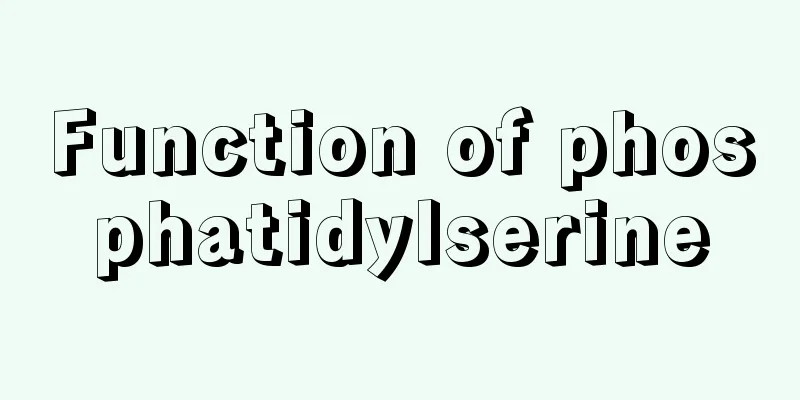Function of phosphatidylserine

|
Phosphatidylserine is honored as brain gold. It can promote brain recovery and absorption, increase brain vitality, and has a significant effect on improving people's memory loss, lack of concentration and decreased brain function. Therefore, many people will use phosphatidylserine on teenagers, because it can effectively improve the vitality of brain cells, reduce brain pressure, and prevent many problems encountered by teenagers. Main Benefits Phosphatidylserine (PS) is hailed as a new emerging "smart nutrient" after choline and "brain gold" DHA. Experts believe that this natural substance can help cell walls maintain flexibility and enhance the efficiency of neurotransmitters that transmit brain signals, helping the brain function efficiently and stimulating the brain's activation state. Specifically, phosphatidylserine has the following functions. (1) Improve brain function, concentrate attention, and improve memory. A large number of meta-analyses on phosphatidylserine have emerged in Europe and the United States (meta-analysis refers to a systematic quantitative or qualitative synthesis of multiple independent research results on a certain issue). Its main purpose is to reflect the previous research results more objectively. An analysis of nine double-blind, placebo-controlled clinical trials involving a total of 1,224 patients showed that cognitive and memory parameters were significantly improved after supplementation with phosphatidylserine. There is no doubt that phosphatidylserine supplementation can improve long-term memory, long-term cognition, and the ability to speak freely and logically. As we age, phosphatidylserine and other important brain chemicals gradually decrease, leading to decreased memory and cognitive abilities. Supplementing with phosphatidylserine can increase the number of neuronal synapses in the brain, the fluidity of brain cell membranes, and promote glucose metabolism in brain cells, thereby making brain cells more active, promoting concentration, and improving alertness and memory. Phosphatidylserine supplements are widely used in Italy, Scandinavia and other European countries to treat cognitive impairment and memory loss caused by aging. (2) Improve students’ academic performance. Someone once specifically tested the effect of phosphatidylserine in relieving mental stress. The trial used a double-blind, placebo-controlled approach, and gave healthy college students 300 mg of phosphatidylserine every day for 30 consecutive days. College students were required to complete a math test of a certain difficulty within a given time and record their responses to stress. The results showed that students who used phosphatidylserine had better reaction time, confidence and performance than the control group, and they also performed better in the exams. A study of 120 high school seniors from Chongqing Bashu Middle School also found that after 40 days of taking enhanced phosphatidylserine, students' verbal and non-verbal memory improved significantly. (3) Relieve stress, promote recovery from mental fatigue, and balance emotions. Several studies have shown that phosphatidylserine can significantly reduce the level of excessive stress hormones in people who are under work pressure, reduce stress, and relieve brain fatigue; phosphatidylserine can also act on the levels of neurotransmitters in the brain that affect mood, which can promote concentration, improve alertness and memory, and help relieve negative emotions (such as depression, frustration, etc.). (4) Help repair brain damage. Phosphatidylserine is one of the main components of brain nerves. It can nourish and activate the activity of various enzymes in the brain, slow down the reduction of neurotransmitters, help repair and renew damaged brain cells and eliminate harmful substances. It can restore the memory of the elderly to the level of 14 years ago. Studies have shown that after consuming phosphatidylserine for 12 weeks, a 66-year-old person has the memory of a 52-year-old. In addition, phosphatidylserine and DHA can promote each other's absorption and play a protective role on nerve 2A cells. Rich in phosphatidylserine, it can increase the fluidity of cell membranes and promote the development of intelligence. Phosphatidylserine and DHA together can protect the central nervous system and promote fetal intellectual development. Studies have shown that the main reason why phosphatidylserine can enhance human intelligence is that it can quickly cross the blood-brain barrier and enter the brain. It relaxes the smooth muscle cells of cerebral capillaries and increases blood supply to the brain. Therefore, in recent years, many products targeting stroke have used PS as raw material. |
<<: Is it serious to have a few lecithin bodies?
>>: What diseases can be caused by excessive anger?
Recommend
What should you eat to prevent lung cancer? Introduction to daily precautions for lung cancer
The full name of lung cancer is bronchial lung ca...
What causes back pain due to cervical cancer
Lower back pain caused by cervical cancer require...
Causes of physical fatigue
Work has become a part of our life rhythm. Each o...
The back of my head hurts when I shake it
In life, we always encounter various diseases. So...
Is scabies easy to cure?
There are many bacteria and insects that are invi...
How to wash grapes
Nowadays, food hygiene and safety is an issue tha...
Is cherry the fruit of cherry blossoms?
Cherry and cherry blossom are two different plant...
Under what circumstances will you get bile duct cancer
As the times continue to progress, the incidence ...
Do I need to fast for myocardial enzyme testing?
To test myocardial enzymes, we actually need to d...
Can Still's disease be cured?
Still's disease is a polyarticular disease th...
How to treat sleep terrors?
Many people often suffer from sleep phobia in the...
Is the radiation from electronics factories dangerous?
Now we live in a society of electronic products. ...
How to maintain after glioma is cured
We all know the seriousness of tumors. Gliomas ar...
Why do I have stomach pain and diarrhea every afternoon?
Diarrhea and abdominal pain are actually quite co...
How to provide care for patients with small cell lung cancer
How should patients with small cell lung cancer d...









